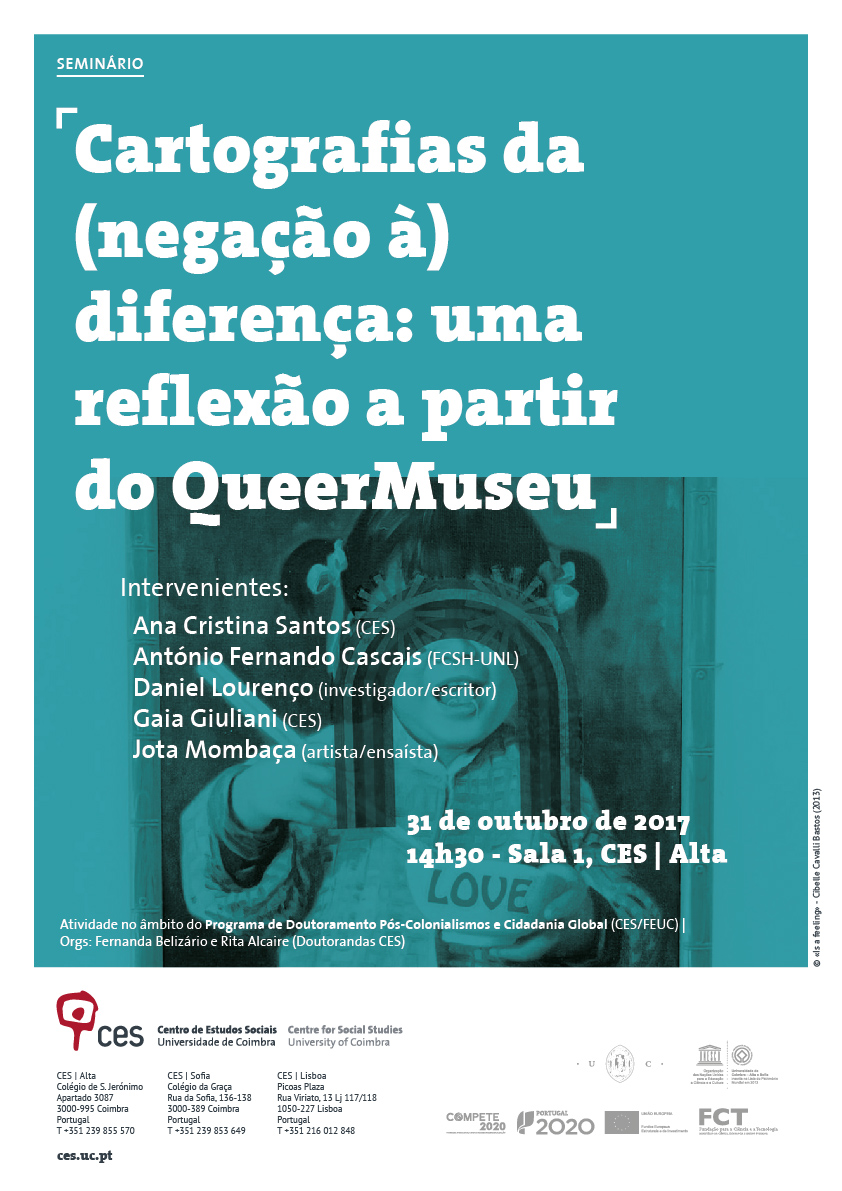Seminar
Cartographies of (denial of) Difference: a reflection from the QueerMuseu
October 31, 2017, 14h30
Room 1, CES | Alta
Framework
 On September 10, Santander Cultural cancelled, without communicating to the curator, the exhibition “QueerMuseu: cartografias da diferença na América Latina” [QueerMuseu: cartographies of difference in Latin America]. The justification for the cancellation of this exhibition in Porto Alegre, by its sponsor, was based on the accusation of encouraging paedophilia, bestiality and offence on common decency stirred by conservative groups in Brazilian social networks (and not only).
On September 10, Santander Cultural cancelled, without communicating to the curator, the exhibition “QueerMuseu: cartografias da diferença na América Latina” [QueerMuseu: cartographies of difference in Latin America]. The justification for the cancellation of this exhibition in Porto Alegre, by its sponsor, was based on the accusation of encouraging paedophilia, bestiality and offence on common decency stirred by conservative groups in Brazilian social networks (and not only).
Queermuseu intended to give visibility to the diversity of expressions of gender and sexuality in art and culture from the mid-twentieth century to the present, bringing 270 works signed by 85 artists, among consecrated and marginalized names within the art market.
The debates generated by the closing of this exhibition are another catalysing element for conservative expressions that have been gaining ground in Brazil after the parliamentary coup. These conservative expressions attack the diverse sexuality and gender, presented as the space of the unstable and moral panic, relegated to the place of the unspeakable, the nameless, to corporal and cognitive violence.
This seminar intends to think, from various epistemological horizons, the articulations and consequences of art that disputes the cisgender, heterosexist, white, capitalist and colonial order of the world, having as background the notoriety caused by the cancellation of the QueerMuseu exhibition
Activity under the Doctoral Programme Post-Colonialisms and Global Citizenship (CES/FEUC) | Organisers: Fernanda Belizário and Rita Alcaire
Guests
Ana Cristina Santos – is a Sociologist. She holds a PhD in Gender Studies, University of Leeds, UK. She is a Senior Researcher at the Centre for Social Studies, University of Coimbra, and Honorary Research Fellow at the Birkbeck Institute for Social Research, University of London. She has been involved in and/or coordinated a number of research projects exploring issues of gender, sexual and reproductive rights, citizenship and human rights. Coordinator of the International PhD Program Human Rights in Contemporary Societies and Vice-chair of the Sexuality Research Network of the European Sociological Association between 2012 and 2016, Cristina is also an activist in the LGBT/queer and feminist movements in Portugal. Her most recent book is Social Movements and Sexual Citizenship in Southern Europe (Palgrave Macmillan, 2013). Other Significant publications include Cometi um Crime? Representações sobre (i)legalidade do aborto (Afrontamento, 2010), Bound and Unbound: Interdisciplinary Approaches to Genders and Sexualities (Cambridge Scholars Publishing, 2008), Estudos Queer: Identidades, Contextos e Acção Colectiva (Revista Crítica de Ciências Sociais, 76, 2006) and A Lei do Desejo: Direitos Humanos e Minorias Sexuais em Portugal (Afrontamento, 2005). In 2013 she was awarded a Research Grant by the European Research Council to lead a 5 years comparative study on Citizenship, Care and Choice: The micropolitics of intimacy in Southern Europe. The research involves conducting cross-national qualitative studies in Italy, Portugal and Spain on the following topics: lesbian coupledom, polyamorous relationships, assisted conception and surrogacy, naming a child, transgender and care, and living with friends in adult life (www.ces.uc.pt/intimate).
António Fernando Cascais - Professor Auxiliar no Departamento de Ciências da Comunicação da Faculdade de Ciências Sociais e Humanas da Universidade Nova de Lisboa e investigador do Centro de Estudos de Comunicação e Linguagens onde coordenou os projectos FCT de I&D Modelos e Práticas de Comunicação da Ciência em Portugal (2004-2009) e História da Cultura Visual da Medicina em Portugal (2009-2013). Organizou três números da Revista de Comunicação e Linguagens - “Mediação dos Saberes”, “Michel Foucault. Uma Analítica da Experiência” e “Corpo, Técnica, Subjectividades” - e os livros Indisciplinar a Teoria (Fenda, 2004) e A sida por um fio (Vega, 1997).
Daniel Lourenço - É um investigador e escritor que vive e trabalha em Lisboa. Tem um mestrado em Sexual Dissidence in Literature and Culture pela Universidade de Sussex. É doutorando na Faculdade de Letras da Universidade de Lisboa, onde trabalha sobre questões de relacionalidade e afetividade na obra de autoras experimentais contemporâneas (Monique Wittig e Kathy Acker). Os seus interesses incluem os estudos literários e culturais, as teorias queer e feminista(s) e teorias críticas da corporalidade. É o autor dos panfletos poéticos "Lábio/Abril" (Traveller, 2015) e "fox, closet & fist" (Winter Olympics, 2017).
Gaia Giuliani –PhD: University of Torino 2005; Postdocs: University of Bologna 2009; University of Technology Sydney 2010) has been research assistant in Political Theory and Colonial and Postcolonial Studies at the University of Bologna (Italy), Dept. Social and Political Studies (2013-2015) and undergraduate supervisor at the Department of Sociology, University of Cambridge (UK) (2015). She has been honorary visiting scholar at the University of Technology Sydney, NSW (June2007-June2010), at the University of Leeds, UK (Oct-Dec2013) and at Goldsmiths College, University of London, UK (April-Dec2014). Her research interests focus on visual constructions of race and whiteness from an intersectional viewpoint in British and Italian nation-building processes and colonial experiences, the US, the Pacific, and postcolonial Europe. Her methodology crosses Critical race and whiteness studies, Postcolonial Theory, Cultural and Gender studies and uses a number of texts (written and visual; political, literary, and scientific). In 2014 she has founded with several scholars the Interdisciplinary/Intersectional Research Group on Race and Racisms (InteRGRace) that is based at the FISPPA, University of Padua. In 2013 she has become Secretary of the Editors of the Italian academic journal Studi Culturali and a member of the International Advisory Board of the Australian academic journal Settler Colonial Studies. In 2013 she has also become member of the international and interdiscipinary network White Spaces at the University of Leeds. Her research project at CES (2015-) aims at a critical discourse analysis of texts coding 'fears of disasters and crisis' and their cultural, social, and political impact on European self-representations in terms of racial formations and 'white fantasies'. In order to grasp how and to what extent 'fears of disaster' engender European self-representations, it investigates the emotional coding of 'sameness' and 'otherness' at play in modern unified Europe.
Jota Mombaça is a non-binary queer born and raised in the Northeast of Brazil, who writes, performs and conducts academic studies on the relations between monstrosity and humanity, queer studies, decolonial movements, political intersectionality, anti-colonial justice, redistribution of violence, visionary fiction, and tensions between ethics, aesthetics, art, and politics in the production of knowledge in the globalized south-south.
_____________________
[Image: © «Is a feeling» - Cibelle Cavalli Bastos (2013)]


